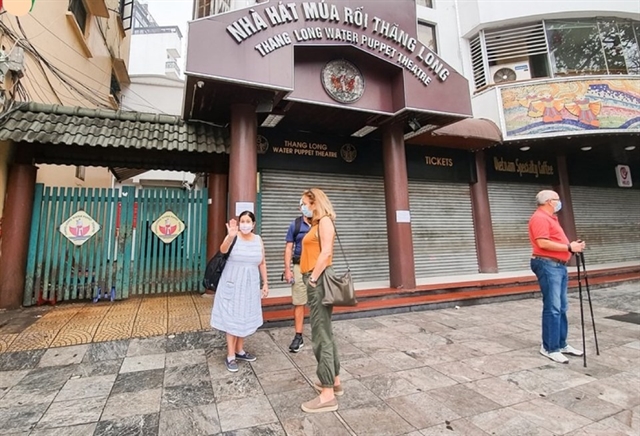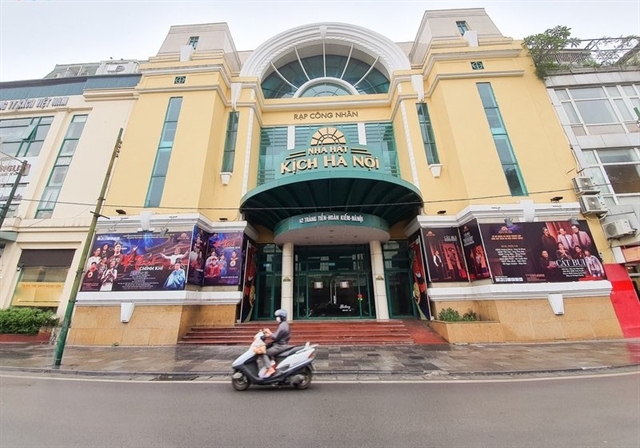 Life & Style
Life & Style

The suspension of all art performances due to the COVID-19 pandemic has caused vast losses to theatres across the country and has forced cultural authorities to set up measures to help them get out of the situation.

|
| Tourists wait outside the Thăng Long Water Puppet Theatre looking for information on its opening. — Photos vov.vn |
HÀ NỘI — The suspension of all art performances due to the COVID-19 pandemic has caused vast losses to theatres across the country and has forced cultural authorities to set up measures to help them get out of the situation.
Representatives, including leaders of large theatres, revealed their concerns at a meeting held recently with the Ministry of Culture, Sports and Tourism (MCST).
They said that many theatres were suffering losses in revenue after announcing temporary closures and suspensions of performances.
MCST Deputy Minister Tạ Quang Đông was informed at the meeting about the operations in the first quarter of the year.
According to a report from the Việt Nam Contemporary Art Theatre, most performers, artists and actors have accepted a pay cut in the past month.
The theatre’s management board also volunteered not to receive salaries while employees were willing to receive only 30 per cent of their monthly salary.
Meanwhile, the Hà Nội Central Circus said the first quarter of last year, the revenue from ticket sales reached over VNĐ2.4 billion but this year, many programmes including those which were carefully prepared to serve the Lunar New Year and performances in the southern province of Đồng Nai, had been postponed.
The circus had to suffer losses worth hundreds of millions of đồng mainly due to the cost of transporting tools and renting space for the stages before they were postponed.
Artists' wages had been significantly reduced, but many of them still had to maintain practice and training.

|
| A view of the front door of Hà Nội Drama Theatre during social distancing. The suspension of all art performances due to COVID-19 has caused vast losses to theatres across the country. |
Many other theatres, especially those operating in the field of traditional art, have also expressed concern that it was hard to retain artists, but it was even harder since the pandemic.
Some representatives proposed specific support mechanisms in the near future.
Reponding to their appeal, acting director of the ministry’s Performing Arts Department Nguyễn Quang Vinh said amid the pandemic, the theatres had to find new models of operation.
He suggested building online theatres.
"The theatres should focus on creating new works relevant for performance online," said Vinh.
The official promised the department would support the promotion and implementation plan for online theatres.
"The performances need to be associated with major events and celebrations, such as the 130th Anniversary of President Hồ Chí Minh's Birthday (May 20), the War Invalids and Martyrs' Day (July 27), the August Revolution (August 19) and the National Day (September 2)," according to Vinh.
Speaking at the meeting, MCST Deputy Minister Tạ Quang Đông expressed sympathy to the theatres and highly appreciated their efforts to overcome hardships.
Đông said the ministry's leaders understood the problems the theatres and artists were facing, so will set up policies to support them in the near future.
According to Đông, the Department of Performing Arts and the Department of Financial Planning would study mechanisms to help increase the number of performances, especially for traditional theatres focusing on large acts.
The deputy minister requested studies on online theatre, to make it relevant and effective when put into operation. He also asked the theatres to focus on practicing and developing programmes to serve political missions.
Đông said the fact was that performing arts were currently lacking large contemporary works.
Therefore, it was the responsibility of the theatres, the Performing Arts Department and the MCST to not only build a project to overcome difficulties in the near future, but also a long-term strategy for further development. — VNS




